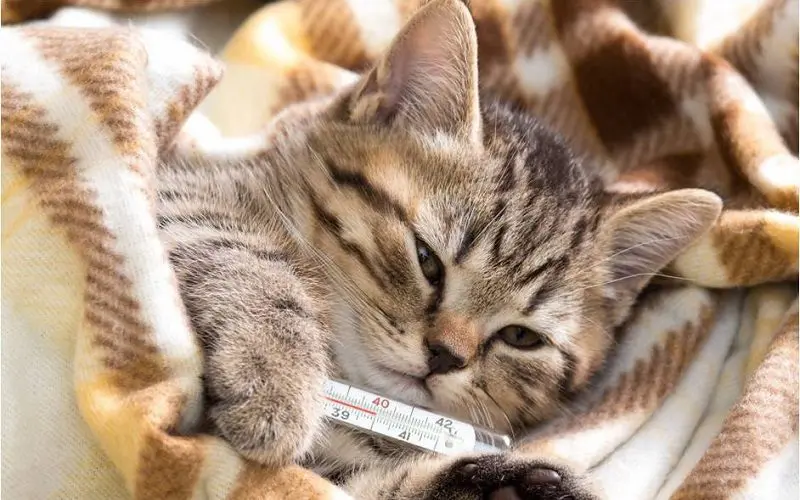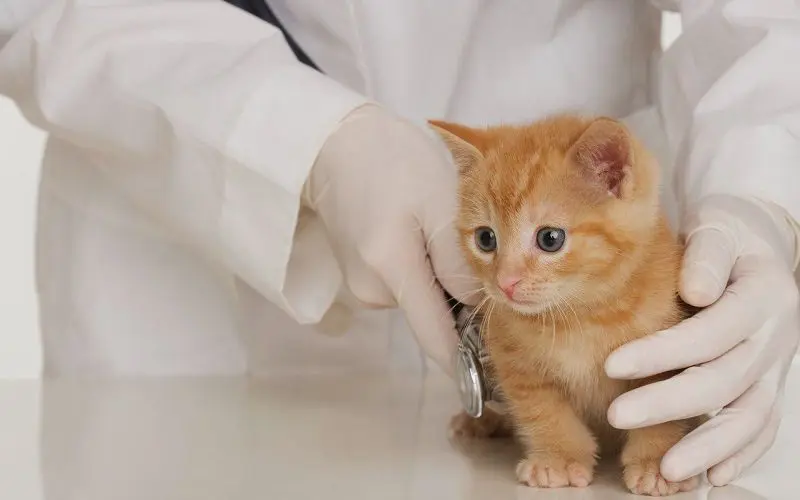Last Updated: 4 months ago
A sick kitten is just about the most pitiful thing on earth, especially when they’re all alone in the great big world.
As a professional in the vet field for 7 years, I saw my fair share of sick kittens, whether they were owned or found.
I also had a lot of people ask what to do if they found a sick kitten and wanted to rescue it.
So today, we’re going to talk about what you should do if you find a sick kitten and want to help him out.
Helping a Sick Kitten: 5 Tips

Helping animals in need is one of the most noble acts a person can do, in my opinion, so I’m fully on board with helping animals when they need it.
Below are some tips to help keep you and the sick little kitty you find safe and healthy both during and after rescue.
1. Observe from a Distance
When encountering a sick kitten outside, it’s crucial to approach with caution.
Observe the kitten from a safe distance to avoid causing additional stress or fear.
This allows you to assess the severity of the situation without startling the vulnerable feline.
2. Be Safe

In my recent post about cleaning cat ears, I referenced how dangerous a cat bite can be.
This goes for kittens as well as adults, so the first thing you need to do is remember to be smart.
That ailing kitten you see may look weak, docile, or even somewhat friendly, but you don’t know his story.
Never, ever, ever approach a sick kitten with your bare hands. A kitten bite can be just as dangerous as an adult bite.
Get a towel and wrap the kitten in that before you pick it up. If you have an adequately sized box or cat carrier available, immediately put the kitten in that.
Do not attempt to hold the kitten as you make your way home. This goes back to cat bites.
If that kitty freaks out in your arms, you are highly susceptible to getting clawed, bitten, or both.
3. Provide Temporary Shelter
Create a makeshift shelter for the sick kitten by placing a box or carrier with a soft towel in a quiet, protected area.
This provides a safe haven while you assess the situation and make the necessary arrangements.
The shelter helps protect the kitten from the elements and reduces stress, promoting a more comfortable environment until professional help is available.
4. Get to the Vet

Get to the vet as soon as possible after rescuing a sick kitten.
If you tell your vet what’s going on, they’ll most likely squeeze you into the schedule for the day, even if they’re booked solid.
If you happen to find a sick kitten after a few hours, it can be a different story.
If you have the inclination and the funds, take the kitten to an emergency vet for an immediate examination.
The kitten may only be malnourished a bit, or he may have something very wrong.
In either case, the sooner you can get the kitten to the vet, the better.
5. Be Prepared for Bad News
Whether you’ve rescued a sick kitten just to be kind or if you want to keep him, it’s important to be prepared for bad news.
The kitten is already sick. It may be a mild condition, or the kitten may have something very, very wrong.
You need to be both emotionally and mentally prepared for the possibility that the cat may need to be put to sleep.
Remember, sometimes it’s the kindest thing you can do.
You Can Help a Sick Kitten
If you see a sick kitten and you want to help, go for it. Just follow the tips above. Be safe, be smart, and get the kitty to the vet as soon as possible.
After that, it’s up to you if the sick kitten becomes a permanent member of the family. I cannot stress this enough, though. Be safe. Don’t get bitten!
Have you ever found and helped a sick kitten? Share your experiences below!


Dr. Linda Simon MVB MRCVS is a locum veterinary surgeon who has worked in London for the past 8 years. She graduated top of her class in small animal medicine from UCD, Dublin. She is currently a member of the Royal College of Veterinary Surgeons. Linda is the resident vet for Woman magazine and a frequent contributor to People’s Friend Magazine, the Dogzone website, Vet Help Direct and Wag! Linda also writes content for the CVS veterinary group, Vetwriter and a number of other establishments.
